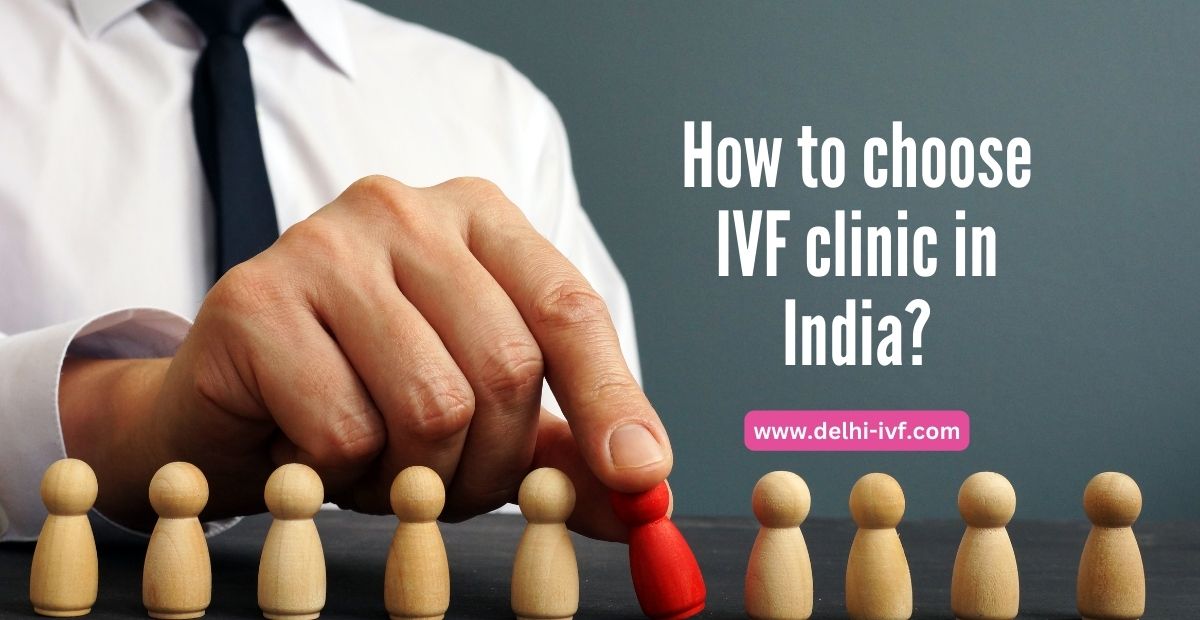IVF stands for in vitro fertilization and is a common fertilization treatment that is slowly making itself known in society. It is one of the most widely famous types of Assisted Reproductive Technology (ART). The procedure includes using a combination of medicines and surgical procedures to help fertilize the egg and then implant the fertilized egg in the fetus. IVF is a month-long procedure that includes several steps from the inception to the fertility stage. It does not have a 100% guarantee of succeeding. Sometimes, it may succeed in one try but many times it takes several tries.
Infertility is a sensitive issue and that is why it is important to have the proper knowledge and a deeper understanding of all the factors before opting for treatment.
Ponts to consider before choosing the Best IVF clinic :
Always choose an IVF center accredited by ICMR.
Although Indian law does not necessarily dictate any egg donation or Altruistic Surrogacy policies, ICMR provides a guideline for the clinics and institutes to follow. The ART Bill passed in 2010 states that any clinic following ART guidelines must keep the client and donor information confidential, no gamete produced by an individual under the age of 21 must be used, and a clinic must not indulge in any commercial element in donor programs or gestational Altruistic Surrogacy, etc. These guidelines help build the patient’s confidence in the clinics.
Success Rate of the Best IVF Clinic
The clinic’s success rate is another factor to deeply analyze before making a decision. While every clinic shows its own success rate, no clinic can guarantee 100% IVF success. So, it’s important that you do your own research on the clinics about their methods and procedures. Make a note that having the highest success rate does not necessarily mean that the clinic is the best. Sometimes, these clinics avoid taking complicated cases that do not have a sure chance of being successful. For example, they refuse treatment of women above 40 with their own eggs. This results in skewing the statistics and data.
What you should be looking for is whether the clinic’s success rate is higher than the national average. Along with this, look up live birth statistics for your age and not just the pregnancy statistics. Plus, make sure to compare their pregnancy statistics to the national average. Always make sure to ask for the clinic’s success rate before choosing one, and the reports are usually included in the CDC reports comparing their reported statistics because some clinics only show satellite data. While there are other points you take notes of, these are the few things that should be kept in mind while making an informed decision.
The Reputation of the Top IVF Clinic in India
Mostly, people get informed about fertility clinics through word of mouth. IVF is a sensitive topic and people usually listen to someone they trust and respect before they search in-depth about the clinics. However, in this data-driven world where technology is taking over every aspect of life, just word of mouth should not be relied upon. Clinic websites, testimonials, feedback, and online reviews of the patients should be taken into consideration before choosing the preferred infertility clinic.
Considering the Fertility Specialists
Before choosing a specialist, there are a few points that should be considered –
When and where were they trained?
You should always look up the qualifications and the experience of the IVF specialist. Sometimes, the doctors complete their training in Obstetrics and Gynecology Residency. A “Fertility Specialist” trains for additional 2-3 years to become a Reproductive Endocrinology and Infertility Specialist. They give up general obstetrics and gynecology and dedicate more to treating their infertile patients. Before moving further, you should make sure your doctor has the highest level of training and expertise in his/her field.
Does your clinic have an andrologist on staff and a Reproductive surgeon?
In the case of male infertility issues, it is important to have an andrologist so that he/she can work together with the reproductive endocrinologist. Also, in cases of endometriosis or any structural issue, a reproductive surgeon is a must.
How long has the director stayed with the clinic?
Stability in the working environment is maintained if the working team does not change every short while and especially the senior staff. In cases like fertility clinics, where everything needs to be critically analyzed before every step, stability in the tenure of the director and the senior staff builds trust among the patients. Also, it makes the management of the clinic and staff easier.
How many reproductive endocrinologists work at the clinic?
It’s always good to know how many expert opinions you are going to receive in your case. Whether your case will be handled by a doctor or a team, and who will you see on your visits? In case of any complication in the case, it’s always beneficial to have a team involved to manage all the details. Along with this, it’s recommended to have an experienced embryologist on the team since he/she is the one who carries out the IVF process of mixing the egg with the sperm. This can help increase the chances of fertilization.
Questions To Ask About Procedures and the Fertility Clinic’s Lab
Is there an age cut-off for treatment?
There are no age cut-offs when it comes to IVF treatments but age remains a primary factor concerning pregnancy success because studies have shown that women in their 20s and 30s have the most successful pregnancies and the success rates have declined once the women have reached mid-30s.
Where are the procedures and tests done?
It is important to consider the location where the procedures and the tests will be done. Make sure to check whether the clinic’s infrastructure is equipped for performing them in the same place. An easily accessible location with proper infrastructure and transport facilities plays an important role when the patients are in their decision-making stage about choosing a doctor.
How many embryos will be transferred in one IVF cycle?
The transfer of embryos depends upon ASRM guidelines and recommendations.
One embryo is transferred to women under the age of 35 with a good prognosis. A maximum of two embryos can be transferred for this age group.
For the woman falling under the age group of 35-37 with a good prognosis, transferring two embryos is recommended. For 38-40 years old, transferred 3 embryos and not more than 4 is recommended. While for the ages of 41 and 42, transferring not more than 5 embryos is recommended. Of course, every individual case should be considered before the procedure.
Questions to Ask About Financing Tests and Treatments
What pricing are various tests and treatments?
While these treatments have become a boon to human existence, they can be costly depending on the treatment and plan you opt for and sometimes the pricing differs from the type of place. So, things like- whether the tests or treatments are covered by the insurance or if the quoted price includes all the required medication and monitoring should be kept in mind and considered before opting for the treatment. IVF Treatment cost around 70,000 to 1,10,000 in standard clinic.
Do they have a payment program?
It’s important to have a proper idea about the finances included in the treatment. Understand the process of IVF. Ask doctors for complete costs Involved in IVF. Ask doctors about the overhead involved in infertility tests like semen analysis, Blood test reports, and thyroid test reports. get complete knowledge about the cost of medication and weathers its included in the IVF package or not? All these are the basic questions that you should have knowledge about beforehand.
How much does embryo freezing and storage cost?
Egg freezing technology in fertility medicine involves a considerable cost. Egg freezing technology involves two types of costs. First is the cost of the procedure for retrieval of eggs and freezing them which is similar to IVF and may vary up to Rs. 50,000 to Rs. 1 lakh. The cost involved in retaining eggs in a frozen state. The annual cost of Freezing eggs may be between 15,000 and Rs. 30,000 per year.


 Your Journey to Parenthood Begins with us!
Your Journey to Parenthood Begins with us!